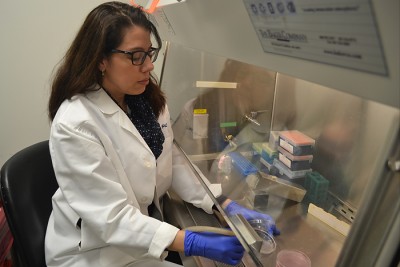
UConn Health postdoctoral fellow Leslie Caromile is celebrating two major accomplishments.
Caromile, who studies prostate cancer in the Center for Vascular Biology, is one of six members of the Keystone Symposia Fellows Class of 2015-2016. Additionally, she has received a grant from the National Institutes of Health for her research.
The Keystone Symposia on Molecular and Cellular Biology offers this fellowship program for postdocs as it seeks to draw researchers from underrepresented populations to study life sciences. Fellows must demonstrate a commitment to inclusiveness in the life sciences and mentor young scientists from underrepresented populations.
“I have been passionate about science for as long as I can remember,” Caromile says. “I spent my childhood at natural history museums and science fairs, on camping trips and nature hikes, in vegetable gardens and green houses, and with telescopes and microscopes.”
Caromile’s research on the transmembrane peptidase prostate specific membrane antigen (PSMA) and its function in prostate cancer tumor behavior is supported by the NIH/National Cancer Institutue K01 Mentored Research Scientist Award to Promote Diversity, amounting to more than $500,000 over five years.
“I am tremendously honored to receive both these awards and to be included in these groups of highly motivated researchers,” Caromile says. “I am looking forward to not only an active role as a scientist here at UConn Health but also as an active mentor and mentee.”
Caromile is of Eastern Cherokee heritage. She works in the laboratory of Linda Shapiro, director of the Center for Vascular Biology.
“Leslie Caromile is a gifted and innovative researcher who has independently developed an observation into a fascinating story unraveling critical mechanisms driving prostate tumor progression,” Shapiro says. “The award of the mentored training grant from the National Cancer Institute and her selection as a Keystone Fellow exemplify the caliber of her research and her dedication to promoting science education.”
